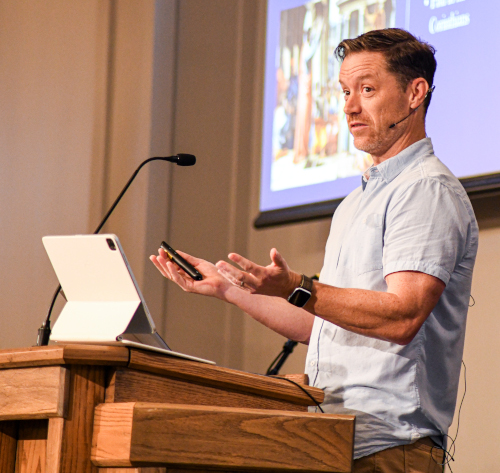JACKSON, Tenn. — Sept. 9, 2025 — Listening carefully to the world is the way to build a connection with it, Joshua Chatraw advised a group of high school students on the Union University campus Sept. 6.
“That's called double listening,” said Chatraw, the Beeson Divinity School Billy Graham Chair for Evangelism and Cultural Engagement at Samford University. “We listen to the word of God, and we listen to the world, but we listen differently. We listen to the world with critical alertness – anxious to understand it – but resolve to not necessarily believe it.”
Chatraw was the keynote speaker at the fourth annual EQUIP Youth Apologetics Conference that drew more than 300 high school students to the Carl Grant Events Center. He said he desired to equip teenagers with the tools to interact with the problems afflicting the world but also their churches.
The conference, sponsored by Union’s School of Theology and Missions and the Tennessee Baptist Mission Board, was designed to challenge high school students to think critically about biblical truths and provide answers for theological questions they may have.
Additional speakers were Jay Barbier, Harvest Field team leader for the TBMB; Justin Barnard, professor of philosophy at Union; and Ryan Keaton, the Strengthening Evangelistic Disciples team leader at the TBMB. They furthered that goal with breakout and plenary sessions of their own.
Chatraw, however, wanted to focus specifically on challenging the high school students’ worldviews by helping them find connections between the church and the world.
Using Acts 17, Chatraw explained how Paul employed Greek philosophers to witness to the Athenians. By doing this, Chatraw said, Paul was showing the evangelical effectiveness of actively listening to the world and adapting preaching without compromising the gospel.
Chatraw did not just stop in Athens, however. After explaining the importance of first building a connection with the world in order to witness, Chatraw moved on to highlight Paul’s letters to the church in Corinth, a Christian community. He focused especially on how churches often face many of the same problems as the outside world, something high school student Calli Pendergrass found beneficial.
“Equipping us to go out into the world and talk to non-believers is super important,” Pendergrass said. “But you also need to know what the Bible says and how to interpret it when talking to Christians. Christians a lot of times try to twist what the Bible says, too.”
According to Chatraw, the reason for that is that nonbelievers and believers are often “formed by the same narratives,” meaning they are influenced by the same culture and often struggle with similar issues.
“Before we say, ‘Oh look at those Athenians, look at those pagans,’ we need to realize we're surrounded by the same cultural narratives,” Chatraw said. “So, we know the pain – we know the challenges of that – and that will help us listen better to our world’s Athenians and Corinthians.”
Chatraw then described four main issues he sees plaguing both the world and the church: having less confidence in faith and truth, desiring to feel good over everything else, resisting Christianity for moral reasons and worshipping consumerism.
“This kind of highlighted that the world is hurting but also always has an agenda,” said Liese Hoover, a mother of two high school students attending the conference. “A lot of times, we think entertainment is just entertainment. It’s not. But there’s also a lot of people who are really looking for truth; they just aren’t looking in the right places, and that leads to so much pain.”
To wrap up the session, Chatraw brought back the idea of double listening, explaining that it is impossible for a believer to get through to an unbeliever while treating them as a pagan to destroy in an argument.
“We need to slow down and be curious about other people,” Chatraw said. “Only then will you find what those people are really seeking. Most of the time, they are seeking to be loved. To understand any culture, we must discover its greatest anxiety and its deepest longing.”
To Chatraw, that is the key to successful apologetics and missions: empathy. It is about Christians doing the work to understand a culture without becoming consumed by it.
“This conference especially has helped increase my awareness,” Hoover said. “We hear the phrase ‘of the world’ versus ‘in the world’ a lot. But what does that really mean for us practically? How do we actually do that without getting dragged in? The application of that was brought forth today.”

